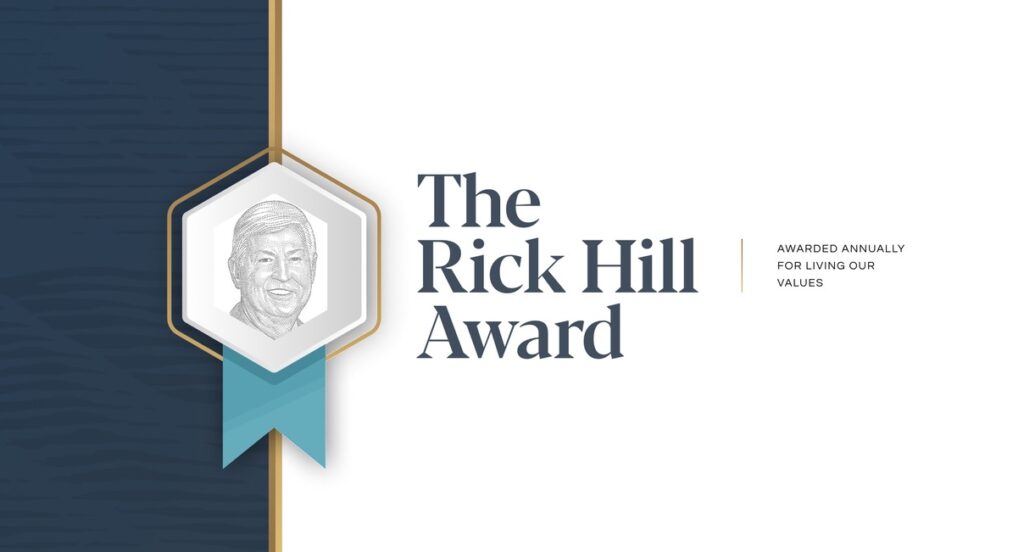Details Are Part of Our Difference
David Booth on How to Choose an Advisor
20 Years. 20 Lessons. Still Taking the Long View.
Making the Short List: Citywire Highlights Our Research-Driven Approach
The Tax Law Changed. Our Approach Hasn’t.
Author: Nick Ashby
Reminder, The Rick Hill Award Nominations Still Open

When Rick Hill officially retired in 2023, our team wanted to continue celebrating his incredible legacy with the Rick Hill Award. As you may recall from an earlier post, I am the proud first recipient.
This annual award, paired with financial recognition, is presented to the team member who best exemplifies living our firm’s values (see below for the list) throughout the prior year. We’ve been paying close attention to those moments in 2025 when teammates have gone above and beyond, and we want to include our clients in the “voting” process.
So, please consider taking the time to nominate someone you believe deserves this honor! If you’ve had a meaningful interaction with a team member that reflects Rick’s and our firm’s values, please email Matt Hall directly. Please include the individual’s name and one or two examples of why you are nominating this person. We value your insight and are grateful for your help in recognizing the teammates who make our firm extraordinary.
The nomination window closes soon, so don’t wait!
We’ll share the news about this year’s winner right here in the February 2026 issue! If you need a refresher on the Hill Investment Group Values, revisit this article, otherwise nominate someone below.
The Rick Hill Award Nominations are Open
 When Rick Hill officially retired in 2023, our team set out to celebrate his incredible legacy with the Rick Hill Award. As you may recall from an earlier post, I was honored to be the first recipient.
When Rick Hill officially retired in 2023, our team set out to celebrate his incredible legacy with the Rick Hill Award. As you may recall from an earlier post, I was honored to be the first recipient.
This annual award recognizes the team member who best embodies our firm’s values throughout the year. In 2025, we’ve been watching for the quiet, consistent moments when teammates go above and beyond, and we’d love your help in identifying those who deserve this honor.
If you’ve had a meaningful interaction with a member of our team that reflects Rick’s spirit and our firm’s values, please email Matt Hall directly. Just share their name and a brief example of why you’re nominating them. Your insight helps us recognize the teammates who make our firm extraordinary.
Nominations close January 31, 2026.
We’ll share this year’s winner in the February 2026 issue.
Corporate values are often empty statements on walls or stickers on laptops. Ours aren’t. We try to live them quietly and consistently, not plaster them everywhere. Below are the six values that guide our work every day.
EVIDENCE-BASED INVESTING EVANGELISTS
We don’t choose gunslingers and gurus to manage the real wealth of clients or our own. We favor evidence-based investment approaches that are designed to be disciplined, diversified, and repeatable over time.
MAKING FRIENDS IS OUR BUSINESS
Inspired by the old Anheuser-Busch mantra, relationships are at the heart of what we do. Sometimes, friends become clients, and often, clients develop genuine connections with our team. “There will be neither frustration nor failure where there is friendship.”
CHEERS AND THE FOUR SEASONS
Hill Investment Group is a place where we truly know our clients. We know what they like to drink and the preferences that make them who they are. We see clients and serve them in a manner befitting a familiar yet high-end experience. We value hospitality, reliability, and excellence.
PATIENCE AND DISCIPLINE
The rewards of the long view are only possible when we help our clients stay focused on what truly matters.
CANDOR
We value the truth (no spin) and commit to sharing it with one another and our clients, especially when it’s hard.
FUN GOES WITH BUSINESS
We take our work seriously and have fun in the process! We celebrate our wins and recognize life and work milestones at every chance.
Hey Hill! How Do I Protect Myself in the Digital Age?

At Hill Investment Group, we’ve found that when a few clients ask similar questions, many more are likely thinking the same thing. To better serve you, we’re introducing our “Hey Hill” series—addressing common client questions and sharing our perspective.
To submit a question for a future post, email us at service@hillinvestmentgroup.com.
Online scams are becoming more sophisticated, and anyone can be a target. Scammers are constantly developing new ways to access personal and financial information, whether it’s a fake email or a suspicious phone call.
We’re sharing examples of common fraud tactics we and others in the industry have observed, along with simple steps you can take to protect yourself and others.
Phishing Emails, Texts, or Letters
These are among the most common scams, and you likely encounter them daily. They’re often disguised as messages from banks, delivery services, or companies you recognize. The goal is to get you to click a link or share sensitive information.
What to watch for:
- Misspelled sender addresses or strange-looking links
- Urgent language (e.g., “24-hour notice” or “Immediate action required”)
- Requests for passwords, authentication codes, or personal data
What you can do:
- Don’t click suspicious links—hover and verify before clicking
- Contact the company directly through a known phone number or website
- When in doubt, delete the message
Impersonation Scams
Scammers may pose as government agencies (IRS, FBI, Sheriff’s Office), financial professionals, or even friends and family members in distress.
Common examples include:
- Claims that you owe money or face legal consequences unless you send funds immediately
- Urgent, secretive requests for access to your personal devices or accounts
- Promises of cryptocurrency “bonuses” or internet transfers via platforms like PayPal or Zelle
What you can do:
- Hang up and independently verify by calling an official number
- Don’t share personal information unless you initiated the contact
- Use two-factor authentication wherever possible
- Be skeptical—even caller ID can be faked
- Remember: government agencies will never request payment via cryptocurrency or gift cards
Staying Vigilant
Scammers rely on confusion and speed. If something feels off, pause and verify.
At Hill Investment Group, we take data security seriously. Our team undergoes regular training, and we maintain internal protocols to reduce cybersecurity risks. We also partner with a large custodian that maintains dedicated fraud prevention and monitoring teams.
If you’re unsure whether something is legitimate—or if you just need a second opinion—don’t hesitate to reach out to us or a trusted family member. We’re here to support your financial well-being and help you stay secure in an increasingly digital world.
Disclosures:
This material is for informational purposes only and does not constitute legal, tax, or investment advice. Hill Investment Group is an SEC-registered investment adviser. Registration does not imply a certain level of skill or training. Always consult with your professional advisors before making decisions related to your personal security or financial situation.

